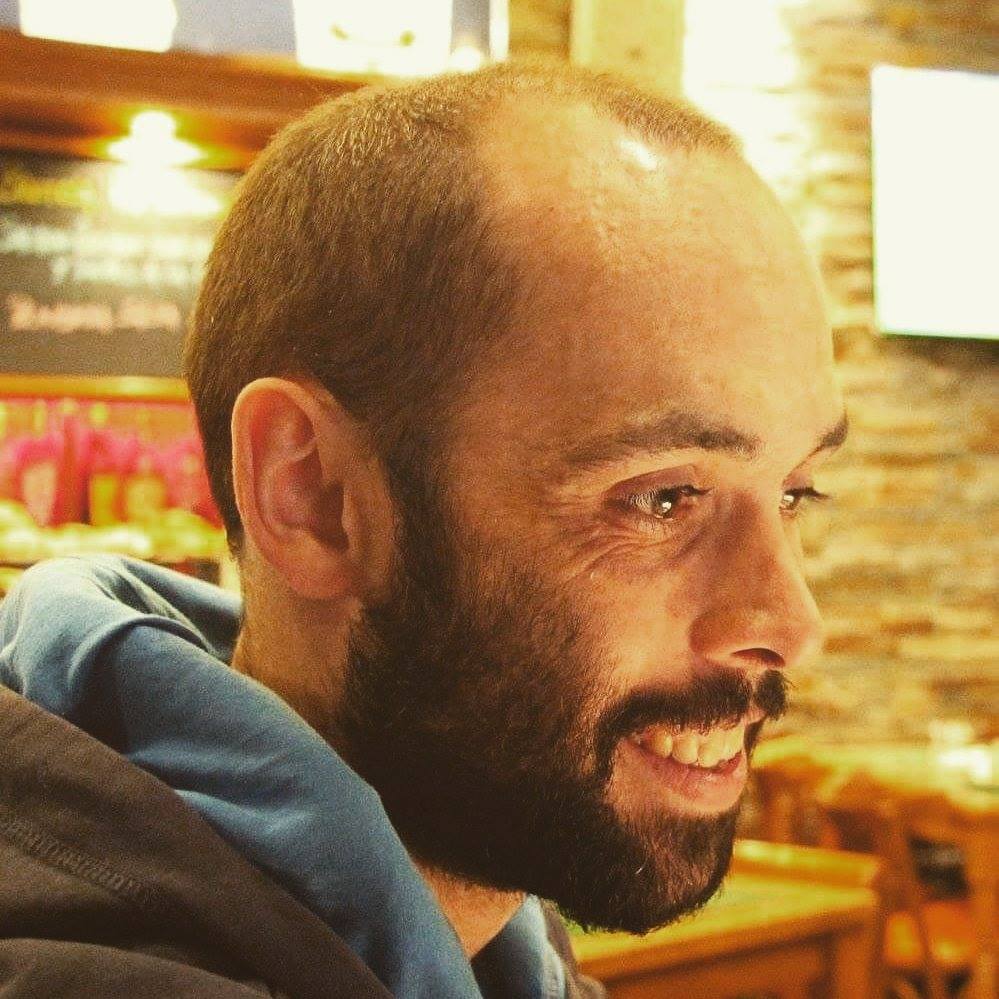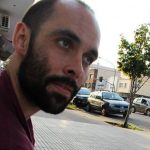
Featured Member: Maarten Geeroms
Featured Member shines a spotlight on the diverse research interests of, and the exciting projects undertaken by, those affiliated with the Cultural Memory Studies Initiative. In this sixth instalment of the series, we speak to Maarten Geeroms, who is a PhD researcher in the Department of Literary Studies at Ghent University.
What is the topic of your PhD research?
I am working on a PhD project on literature about the last Argentine dictatorship (1976-1983), particularly on novels by authors who were growing up during those years and who deal with the dictatorship’s legacy in their writings. The majority of my corpus texts were written by sons or daughters of activists who disappeared at the hands of state repression (the so-called hijos), while others, usually published a bit later, describe more vicarious experiences.
What first attracted you to studying Latin American, and specifically Argentine, literature?
I could probably answer this question in two sentences or two pages. I will do my best to land somewhere in between. Firstly, I have to admit that there was undoubtedly some exoticism involved: back in the 1990s, two uncles of mine moved to Honduras, in Central America – as a matter a fact, one of them still lives there. I remember how their stories always fascinated me immensely when I was a kid. On top of that, I loved learning new languages and was always carrying a book around, so studying Spanish literature was an obvious choice. Maybe too obvious, even: during my first stint at university, I started wondering if I had thought my options through enough and grew increasingly frustrated. I dropped out after a couple of years and took on a series of jobs that could not be further removed from a career as a literary scholar (as a travel representative and a supermarket attendant, among other things). 
Eventually, I decided to re-enrol, which has turned out to be the best roll of the dice I ever took. I had a lot of courses in Spanish still to finish, and re-discovered my love for the language. Some of Professor Ilse Logie’s courses on contemporary Latin American literature particularly blew me away, especially the one on the representations of violence in the continent’s post-dictatorships. I did my bachelor paper with Ilse, and absolutely loved that first experience of really diving into a book and peeling away its layers. As a master student, I had the chance to spend a semester in Argentina, at the Universidad Nacional de La Plata. Here, I should note that the legacy of the country’s last dictatorship is still very much a matter of public debate. Being immersed in that context and learning about its literary representations firsthand was what finally tipped me over.
Can you tell us something about what your research has uncovered?
The books that I am studying are part of what is often described as a “subjective turn” in Argentine literature, and in “second-generation” literature in Latin America’s Southern Cone in general. Thematically, these books usually take the protagonist’s intimate sphere as their starting point, as opposed to the more obviously political testimonial texts of the 1980s and 1990s. Criticism of these texts predominantly focuses on the affective dimensions of the works. All of this is particularly significant in the Argentine context, where memory work and activism, on the one hand, and kinship with the dictatorship’s victims, on the other, have been intricately bound together ever since the Mothers of the Plaza de Mayo held their first public protests back in 1977.
Personally, while I don’t necessarily disagree with the idea of a subjective turn, I feel that there is also a real concern in the majority of these texts for the social and structural mechanisms of memory formation. Although there is certainly literary research out there that touches upon this aspect, I find that there is a systematic dimension to it that has not yet been mapped out as such.
What impact do you hope your research will have?
There is real attention in the Southern Cone for the socially mediated dimension of memory formation, usually from sociologists such as Elizabeth Jelin, Daniel Feierstein, and Gabriel Gatti. In my wildest dreams, I hope my research can help bridge the gap toward literary studies, and contribute to an understanding of the dynamics between memory literature in Argentina and the Southern Cone, on the one hand, and its sociocultural context, on the other.
Are there any specific texts, concepts, or methods from memory studies that you have found particularly useful?
Trauma is a big part of my research, and some of the classical texts – Cathy Caruth, Dominick LaCapra – have been with me since my master’s thesis. So has Elizabeth Jelin, whose Los trabajos de la memoria (2002) was my first encounter with the sociological dimension of memory work. Luis Martín-Cabrera’s 2016 Justicia Radical – originally published in English as Radical Justice – contains a higly original chapter on the individual and collective resonance of trauma in Spain and Latin America, which re-appraises Lacanian psychoanalysis and Caruth’s reading of it: that has been extremely helpful these last months. Ana Ros’s notion of the “post-dictatorship generation,” which she coined during her research on the Argentine, Chilean, and Uruguayan post-dictatorships, was very useful for thinking through the dynamics of Argentine memory formation beyond the realm of the victims and their kin. Recently, Jeffrey Alexander’s Trauma: A Social Theory (2012) has helped me make some significant breakthroughs in my work, which I now hope to articulate with more recent work by Jelin, particularly her book La lucha por el pasado (2017).
How would you describe the dynamic between Hispanic and Anglophone memory studies?
If I am honest, I can only really speak for how Anglophone memory studies resounds in the Hispanic world. In Argentina and the Southern Cone, Freudian and Lacanian psychoanalysis had a notable impact on scholarly research: the 1970s saw a boom of highly influential theorists in those fields (León Rozitchner, most notably), whose impact can still be noticed. Surprisingly, however, Anglophone trauma studies took quite a while to seep through: for some time, LaCapra – and not, for instance, Caruth or Felman and Laub – was one of the few Anglophone trauma theorists whose works had any really significant traction. Marianne Hirsch’s writings on postmemory, on the other hand, were taken up quickly and heavily debated, and are still influential. The dissemination of concepts is uneven at times, and I think that a lot depends on the availability of translations into Spanish.
The other way around, I am in no position to say with any authority. I do know that Elizabeth Jelin’s Los trabajos de la memoria, an absolutely seminal book, was translated as State Repression and the Labors of Memory. Apart from that, there are a number of young Southern Cone researchers in the English-speaking world who are doing really interesting work in both Spanish and English, such as Jordana Blejmar, Cecilia Sosa, and Ana Ros.
Are you collaborating with any other individuals, groups, or networks? How important is collaboration to your research?
Quite important, I would say. My PhD project is co-directed by Professor Teresa Basile from La Plata, where I spent a semester as a master student. We first initiated that collaboration back when I was writing my MA thesis, which was supervised by both Ilse and Teresa, and we have never stopped working together since. Last year, I spent several weeks in Argentina, taking part in a postgraduate seminar that Teresa helped organize. In turn, she herself will be visiting us at the beginning of April, which is something we are all very much looking forward to.
Are there any recent or forthcoming seminars, conferences, exhibitions, or other events that you are particularly enthusiastic about?
Absolutely. As I just said: Teresa Basile is visiting us during the first week of April, and we’ve seized on that opportunity to organize a workshop on the Transformations of Latin American Testimony in the 21st Century, aimed mostly at young researchers. We´ve managed to put together an exciting programme and were able to arrange an interview with a number of authors that took part in the writing of Historias de Exilio, a recently published compilation of powerful testimonies by Latin Americans – mostly Argentines – who were exiled in Belgium because of 1970s state repression. That will take place on 2 April; more information is available here.
Apart from that, I have recently got involved with Encuentro Belgian Latin American Network, a network aimed at fostering debate on Latin American culture, history, and politics in Belgium. From 8 to 10 April, we are organizing a workshop in Leuven, the programme of which also looks great.
Interview conducted via email by Ida Marie Olsen.
